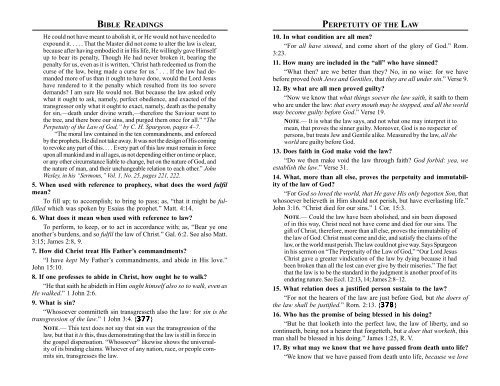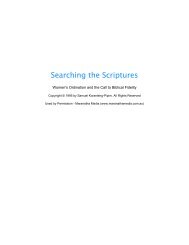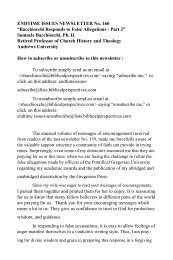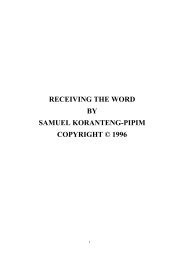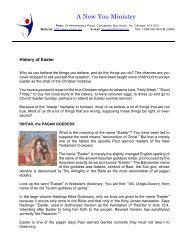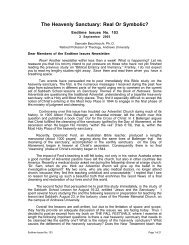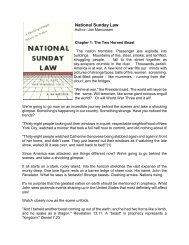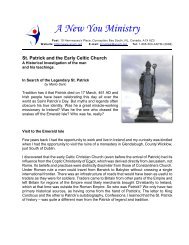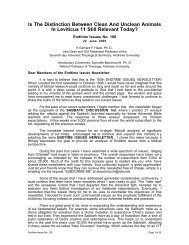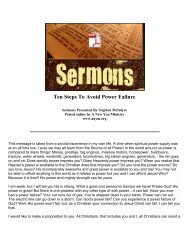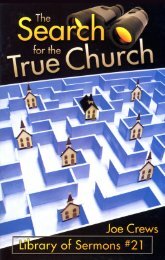Bible Readings for the Home Circleâ1914 - A New You Ministry
Bible Readings for the Home Circleâ1914 - A New You Ministry
Bible Readings for the Home Circleâ1914 - A New You Ministry
Create successful ePaper yourself
Turn your PDF publications into a flip-book with our unique Google optimized e-Paper software.
BIBLE READINGS<br />
He could not have meant to abolish it, or He would not have needed to<br />
expound it. . . . . That <strong>the</strong> Master did not come to alter <strong>the</strong> law is clear,<br />
because after having embodied it in His life, He willingly gave Himself<br />
up to bear its penalty, Though He had never broken it, bearing <strong>the</strong><br />
penalty <strong>for</strong> us, even as it is written, ‘Christ hath redeemed us from <strong>the</strong><br />
curse of <strong>the</strong> law, being made a curse <strong>for</strong> us.’ . . . If <strong>the</strong> law had demanded<br />
more of us than it ought to have done, would <strong>the</strong> Lord Jesus<br />
have rendered to it <strong>the</strong> penalty which resulted from its too severe<br />
demands I am sure He would not. But because <strong>the</strong> law asked only<br />
what it ought to ask, namely, perfect obedience, and exacted of <strong>the</strong><br />
transgressor only what it ought to exact, namely, death as <strong>the</strong> penalty<br />
<strong>for</strong> sin,—death under divine wrath,—<strong>the</strong>re<strong>for</strong>e <strong>the</strong> Saviour went to<br />
<strong>the</strong> tree, and <strong>the</strong>re bore our sins, and purged <strong>the</strong>m once <strong>for</strong> all.” “The<br />
Perpetuity of <strong>the</strong> Law of God,” by C. H. Spurgeon, pages 4–7.<br />
“The moral law contained in <strong>the</strong> ten commandments, and en<strong>for</strong>ced<br />
by <strong>the</strong> prophets, He did not take away. It was not <strong>the</strong> design of His coming<br />
to revoke any part of this. . . . Every part of this law must remain in <strong>for</strong>ce<br />
upon all mankind and in all ages, as not depending ei<strong>the</strong>r on time or place,<br />
or any o<strong>the</strong>r circumstance liable to change, but on <strong>the</strong> nature of God, and<br />
<strong>the</strong> nature of man, and <strong>the</strong>ir unchangeable relation to each o<strong>the</strong>r.” John<br />
Wesley, in his “Sermons,” Vol. 1, No. 25, pages 221, 222.<br />
5. When used with reference to prophecy, what does <strong>the</strong> word fulfil<br />
mean<br />
To fill up; to accomplish; to bring to pass; as, “that it might be fulfilled<br />
which was spoken by Esaias <strong>the</strong> prophet.” Matt. 4:14.<br />
6. What does it mean when used with reference to law<br />
To per<strong>for</strong>m, to keep, or to act in accordance with; as, “Bear ye one<br />
ano<strong>the</strong>r’s burdens, and so fulfil <strong>the</strong> law of Christ.” Gal. 6:2. See also Matt.<br />
3:15; James 2:8, 9.<br />
7. How did Christ treat His Fa<strong>the</strong>r’s commandments<br />
“I have kept My Fa<strong>the</strong>r’s commandments, and abide in His love.”<br />
John 15:10.<br />
8. If one professes to abide in Christ, how ought he to walk<br />
“He that saith he abideth in Him ought himself also so to walk, even as<br />
He walked.” 1 John 2:6.<br />
9. What is sin<br />
“Whosoever committeth sin transgresseth also <strong>the</strong> law: <strong>for</strong> sin is <strong>the</strong><br />
transgression of <strong>the</strong> law.” 1 John 3:4. {377<br />
377}<br />
NOTE.— This text does not say that sin was <strong>the</strong> transgression of <strong>the</strong><br />
law, but that it is this, thus demonstrating that <strong>the</strong> law is still in <strong>for</strong>ce in<br />
<strong>the</strong> gospel dispensation. “Whosoever” likewise shows <strong>the</strong> universality<br />
of its binding claims. Whoever of any nation, race, or people commits<br />
sin, transgresses <strong>the</strong> law.<br />
PERPETUITY OF THE LAW<br />
10. In what condition are all men<br />
“For all have sinned, and come short of <strong>the</strong> glory of God.” Rom.<br />
3:23.<br />
11. How many are included in <strong>the</strong> “all” who have sinned<br />
“What <strong>the</strong>n are we better than <strong>the</strong>y No, in no wise: <strong>for</strong> we have<br />
be<strong>for</strong>e proved both Jews and Gentiles, that <strong>the</strong>y are all under sin.” Verse 9.<br />
12. By what are all men proved guilty<br />
“Now we know that what things soever <strong>the</strong> law saith, it saith to <strong>the</strong>m<br />
who are under <strong>the</strong> law: that every mouth may be stopped, and all <strong>the</strong> world<br />
may become guilty be<strong>for</strong>e God.” Verse 19.<br />
NOTE.— It is what <strong>the</strong> law says, and not what one may interpret it to<br />
mean, that proves <strong>the</strong> sinner guilty. Moreover, God is no respecter of<br />
persons, but treats Jew and Gentile alike. Measured by <strong>the</strong> law, all <strong>the</strong><br />
world are guilty be<strong>for</strong>e God.<br />
13. Does faith in God make void <strong>the</strong> law<br />
“Do we <strong>the</strong>n make void <strong>the</strong> law through faith God <strong>for</strong>bid: yea, we<br />
establish <strong>the</strong> law.” Verse 31.<br />
14. What, more than all else, proves <strong>the</strong> perpetuity and immutability<br />
of <strong>the</strong> law of God<br />
“For God so loved <strong>the</strong> world, that He gave His only begotten Son, that<br />
whosoever believeth in Him should not perish, but have everlasting life.”<br />
John 3:16. “Christ died <strong>for</strong> our sins.” 1 Cor. 15:3.<br />
NOTE.— Could <strong>the</strong> law have been abolished, and sin been disposed<br />
of in this way, Christ need not have come and died <strong>for</strong> our sins. The<br />
gift of Christ, <strong>the</strong>re<strong>for</strong>e, more than all else, proves <strong>the</strong> immutability of<br />
<strong>the</strong> law of God. Christ must come and die, and satisfy <strong>the</strong> claims of <strong>the</strong><br />
law, or <strong>the</strong> world must perish. The law could not give way. Says Spurgeon<br />
in his sermon on “The Perpetuity of <strong>the</strong> Law of God,” “Our Lord Jesus<br />
Christ gave a greater vindication of <strong>the</strong> law by dying because it had<br />
been broken than all <strong>the</strong> lost can ever give by <strong>the</strong>ir miseries.” The fact<br />
that <strong>the</strong> law is to be <strong>the</strong> standard in <strong>the</strong> judgment is ano<strong>the</strong>r proof of its<br />
enduring nature. See Eccl. 12:13, 14; James 2:8–12.<br />
15. What relation does a justified person sustain to <strong>the</strong> law<br />
“For not <strong>the</strong> hearers of <strong>the</strong> law are just be<strong>for</strong>e God, but <strong>the</strong> doers of<br />
<strong>the</strong> law shall be justified.” Rom. 2:13. {378<br />
378}<br />
16. Who has <strong>the</strong> promise of being blessed in his doing<br />
“But he that looketh into <strong>the</strong> perfect law, <strong>the</strong> law of liberty, and so<br />
continueth, being not a hearer that <strong>for</strong>getteth, but a doer that worketh, this<br />
man shall be blessed in his doing.” James 1:25, R. V.<br />
17. By what may we know that we have passed from death unto life<br />
“We know that we have passed from death unto life, because we love


